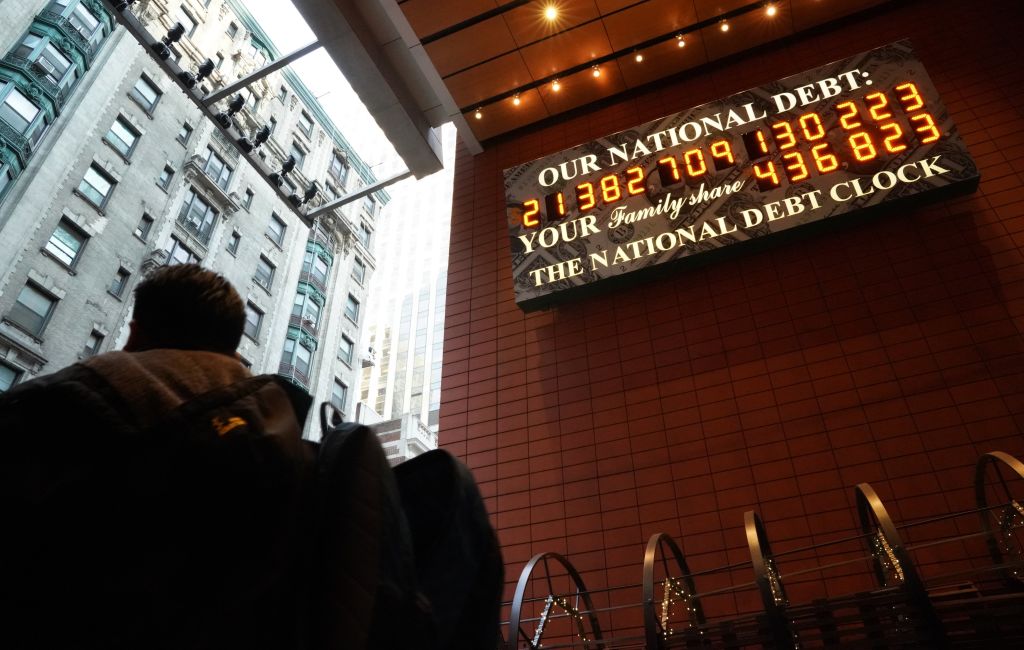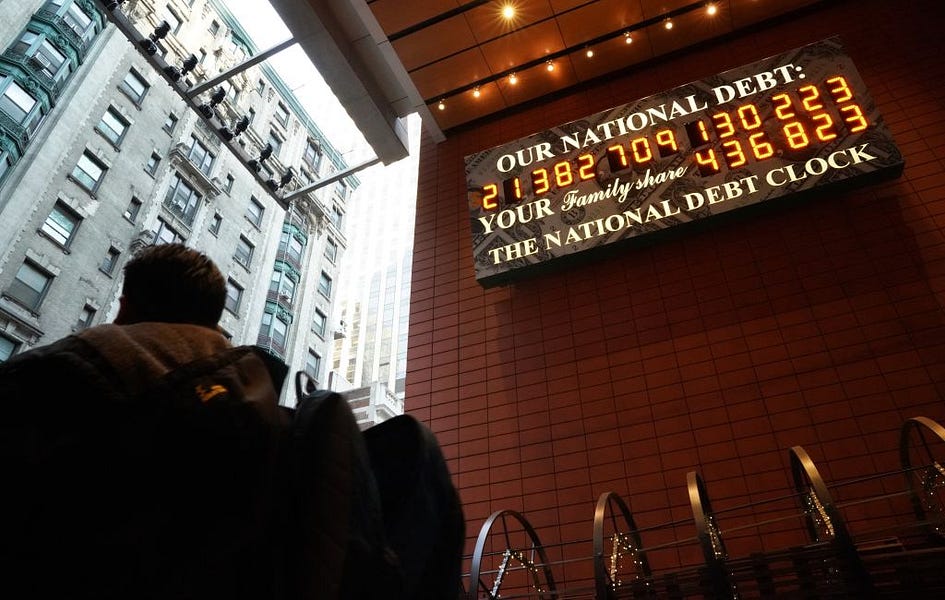Greetings fellow shut-ins,
One of the funny things about national crises is that they tend to confirm everything intellectuals, politicians, and activists already believed. So those who thought we should play hardball or sever all ties with China before the pandemic are even more confident they were right now that it’s hit. If Medicare for All was a great idea BC (Before COVID), it’s a no-brainer AC (Atlantic City, or in this case, After COVID).
I want to be clear: I am probably guilty of this too. I’m just not sure I’m wrong.
The other day I heard Tom Colicchio—the Top Chef guy—holding forth on how this crisis proves people like Grover Norquist wrong. That’s right, he actually mentioned Norquist by name, which was weird. Sort of like hearing Bobby Flay name-drop Paul Weyrich. Anyway, he said:
For the last 40 years, we’ve heard that government is too big, and we need to shrink it down to the size that it’ll “drown in the bathtub.” Thank you Grover Norquist, it’s drowning in the bathtub right now. Now, we can point fingers to everyone, and blame, blame, blame, blame, blame—it’s time to end that. It’s time for the politics to end, it’s time for leaders to step up. This is our World War II moment right now. And we’ll come out of this, and when we come out of this, we need to decide, “What kind of society do we wanna be?” Who do we wanna be? Because we’ll get through this, but we’re gonna get through this together. Because there’s no “I, the person” in this country—it’s “We the people.”
I don’t want to pick on Colicchio because I think he’s a decent guy with sincerely held views. But I also think he’s wrong. Also, I don’t like Norquist’s line about drowning the government in a bathtub, so I don’t want to defend that particular straw man.
But come on.
First of all, there certainly is an “I, the person” in this country, and in our Constitution. One needn’t be an acolyte of the “living constitution” to find notions of individual liberty in, say, the Bill of Rights. But that’s a conversation for another day.
The notion that we’re struggling to cope with coronavirus because government has been starved of resources just strikes me as bizarre. According to the OECD, general government spending—as in, all levels of government—accounted for about 39 percent of our GDP in 2015. More recent data isn’t available, but I’d be surprised if it hasn’t gone up. In 2019, federal spending alone was about 21 percent of GDP. The simple fact is, America spends quite a lot on government provided assistance, services, programs, etc. And we are not some outrageous outlier among advanced economies (that failed-state hell-hole, Switzerland, spends less than we do).
It’s true Italy spends more and they have something very similar to Medicare for All. But did that prevent their predicament?

Despite what you may have heard, Washington has not been run by libertarians over the last 30 years and we do not live in a land of unfettered capitalism. Our tax system is the most progressive of any advanced country. You can argue that we spend those tax dollars poorly or inadvisably—I certainly would—but we haven’t been starving the beast, never mind shrinking it to bathtub-drowning compatibility.
Every five minutes, someone on Twitter or TV says that this crisis proves the need for government, as if the opposite view dominated public life. It doesn’t. No doubt, there are a handful of anarcho-capitalists insisting that a free market nirvana is the ideal way to respond to a pandemic. But having spent a quarter century with little-to-no social distancing among libertarians and conservatives, I have not met many who think the government shouldn’t respond to threats like a pandemic with all the resources available.
This is one of most infuriating rhetorical sleights-of-hand in ideological debates: Take an example of a problem the government should deal with, and then claim it proves that there is no problem the government shouldn’t deal with. I want the government to nuke a meteor heading our way. That doesn’t mean I must think we should have a federal minimum wage.
Having a medical system—or for that matter, an economic system—that is ready to go at a moment’s notice to deal with a sudden pandemic is ridiculous. Should we have bought tens of thousands of extra ventilators 10 years ago on the off chance we’d face this threat? No. They would have sat around collecting dust and the money we spent on them wouldn’t have been spent on other things that were more obviously necessary.
But there’s a difference between being mobilized and being prepared to mobilize if necessary.
I’m not sure this is our “World War II” moment, but let’s say it really was. Let’s imagine that we needed to go to war, not figuratively against a virus, but literally against the Chinese or the Russians or space aliens. Would that mean we should have spent the last 40 years prepared on Day 1 for the total mobilization a world war requires? Should we have trained, housed, and equipped millions of battle-ready-troops? Should we have kept tank and missile production at the level we would want it once the shooting starts? Of course not. But we should have been—and should be—ready to scale up for such an eventuality.
Likewise, we should have been better prepared to scale up to fight this pandemic (as Yuval Levin argues here). And on this point we screwed up. When I say “we” I mean it in the broadest sense possible. The CDC and the FDA were unprepared. Congress was a joke. The Trump administration was unprepared, as was the Obama administration. And, so were the voters and taxpayers. The blame isn’t equally distributed, of course. The people in positions of power have a responsibility to think harder about what the country needs and not just what the voters or the base wants.
But at the macro level, we’ve had a failure of both leadership and followership.
We just concluded the longest economic expansion in American history, and over that time we borrowed trillions and trillions of dollars—much of it from China—to pay for everything from entitlements to the military.
Limited government is prepared government.
There are a great many arguments for living within our means. The most widely invoked one is the immorality of saddling future generations with our debts. Another is the need to avert a calamitous debt crisis. But one you don’t hear much is that it better prepares us for unforeseen disasters. Borrowing money to sustain a calcified and sclerotic federal government in order to avoid making hard and necessary choices is the very definition of kicking the can down the road. It’s also selfish.
The World War II generation was really a part of the Great Depression generation. And one of the lessons Americans took from those experiences was that you should live within your means, because you never know when a disaster might strike. Save your money, because you might need it. Be prepared.
We haven’t lived that way at the federal level. And so while I support the government doing what it can to avert an economic calamity that’s arguably more severe than the public health calamity heading our way, can anyone dispute that we would be better equipped to do so if we spent the last few years streamlining government and paying down our debts?
We are borrowing $1 trillion to pay for this new “stimulus” package. I’m in favor of doing it. But it is outrageous that we have to borrow it and even more outrageous that we will simply add it to the roughly $22 trillion we already owe.
I have no idea what the true financial state of Colicchio’s seemingly (and deservedly) thriving restaurant empire was before the pandemic hit. But it seems to me that if he isn’t deeply in debt and runs a disciplined and efficient operation, he’ll be more nimbly equipped to deal with the pandemic than if he was running a sprawling, debt-ridden mess. Why should this be any less true of government?
Again, I am guilty of the same thing I am condemning in others. I believed in limited government and living within our means before coronavirus emerged in Wuhan, and I believe in both even more now.
But that doesn’t mean I’m wrong.
Photograph of the national debt clock by Timothy A. Clary/AFP via Getty Images.







Please note that we at The Dispatch hold ourselves, our work, and our commenters to a higher standard than other places on the internet. We welcome comments that foster genuine debate or discussion—including comments critical of us or our work—but responses that include ad hominem attacks on fellow Dispatch members or are intended to stoke fear and anger may be moderated.
You are currently using a limited time guest pass and do not have access to commenting. Consider subscribing to join the conversation.
With your membership, you only have the ability to comment on The Morning Dispatch articles. Consider upgrading to join the conversation everywhere.